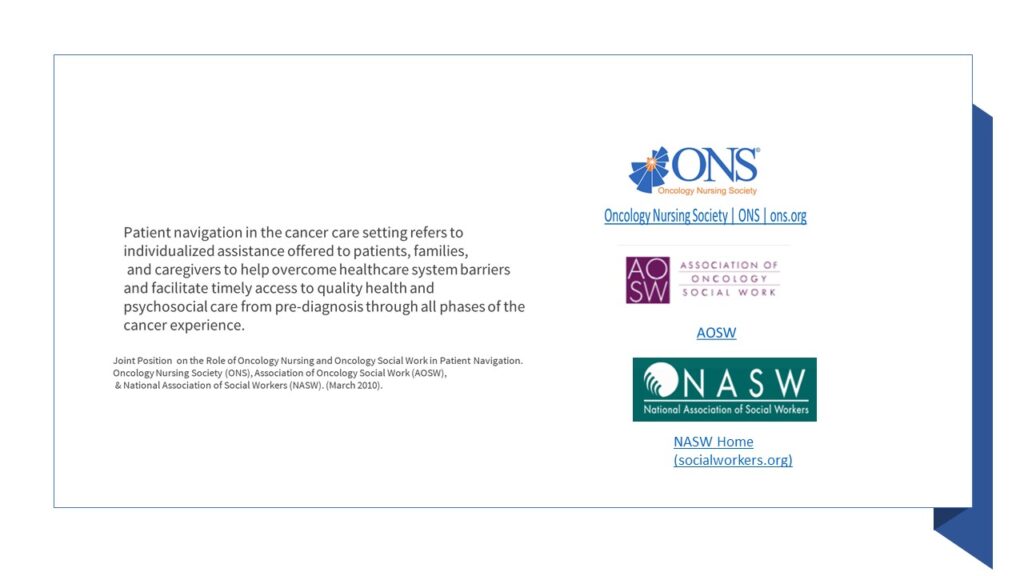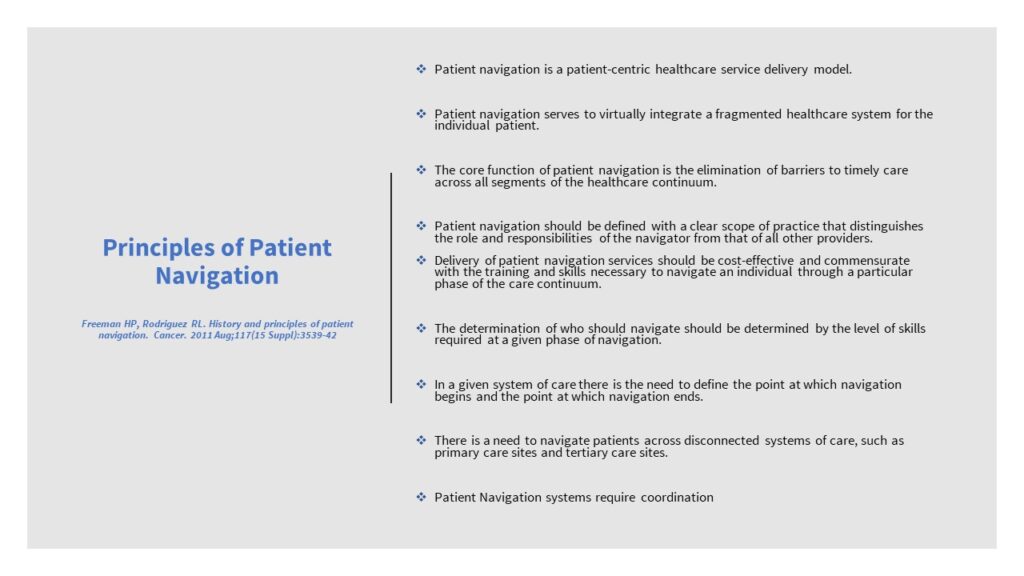About Patient Navigation
Navigating the healthcare system can be confusing and complicated, and making decisions after receiving a complex medical diagnosis such as cancer is challenging for anyone but particularly for populations that have been historically marginalized. Patient navigation is the individualized assistance offered to patients, families, and caregivers to help overcome health care system barriers and facilitate timely access to quality health and psychosocial care. It has been shown to advance health equity and reduce disparities by addressing the needs of people who have been historically marginalized and excluded as well as those living in under resourced communities. Oncology patient navigation extends across the full cancer continuum, beginning with the preventive screening and early detection, through diagnosis, treatment, survivorship, and end-of-life, benefiting all cancer related diagnoses.

No person with cancer should have to spend more time fighting their way through the cancer care system than fighting their disease. – Dr. Harold P. Freeman, Honorary Chair of the National Navigation Roundtable

Dr. Harold P. Freeman
President and CEO
Harold P. Freeman Patient Navigation Institute
Who are Patient Navigators?
A Professional Patient Navigator is a trained individual who is employed and paid by a healthcare-, advocacy-, and/or community-based organization to fill the role of oncology navigator. Professional patient navigators include clinical oncology patient navigators and non-clinical navigators. Clinical patient navigators comprise of oncology nurse patient navigators and oncology social work patient navigators, who utilize nursing or social work process to assist patients. Oncology patient navigators do not have or use clinical training to assist patients.
In 2022, the Professional Oncology Navigation Task Force developed the Oncology Navigation Standards for Professional Practice , a set of oncology patient navigation Standards intended to provide guidance on the knowledge and skills that all professional navigators should possess. The Professional Oncology Navigation Task Force includes several leading oncology-focused professional organizations as well as patient advocacy groups.
These Standards establish benchmarks for healthcare employers and provide information for policy and decision makers, healthcare professionals, and the public to understand the role of professional oncology navigators. The ACS’ National Navigation Roundtable endorses and is committed to promoting the adoption of these Standards.

Why the ACS NNRT?
Building on the visionary work of Dr. Harold Freeman, the ACS NNRT and its members have been building evidence of the positive impact of patient navigation across the cancer continuum through government funded and philanthropic research and the programmatic efforts of the ACS. Some barriers challenging our efforts to improve the lives of people with cancer and their families are too complex for any one organization to address on its own. To overcome these barriers, the ACS united member organizations dedicated to Patient Navigation in collaborative partnerships through its mission-critical National Navigation Roundtable. The ACS national roundtables are a recommended and proven model for creating sustained partnerships across diverse sectors to tackle both long-standing and emerging issues in cancer.

The Cancer Patient Navigation supplement in 2010 was such an incredible resource for the field of navigation. I was delighted to have the opportunity to work with navigators, clinicians, researchers and many in the field provide and update ten years later about the evidence and impact to patient navigation. I know the information and articles showing progress in the supplement will move us closer to the sustainability of patient navigation.

Andrea (Andi) Dwyer, MS
NNRT Chair
The Colorado School of Public Health University of Colorado Cancer Center

History of Patient Navigation
Read about Patient Navigation history over the last several decades.